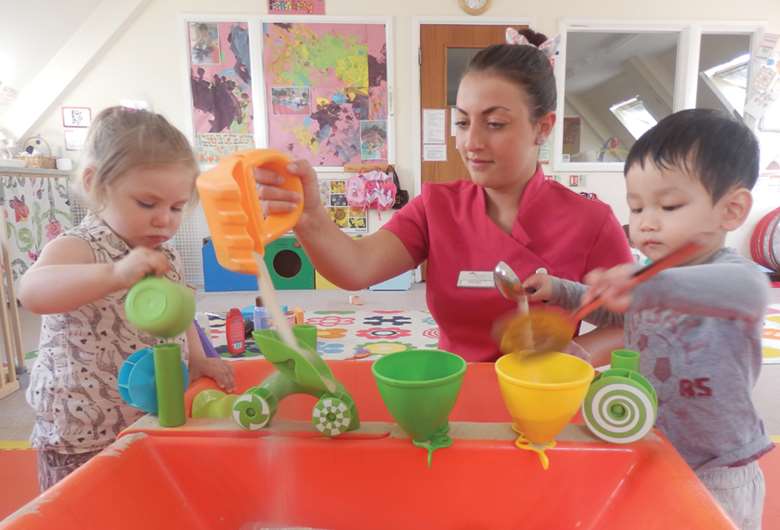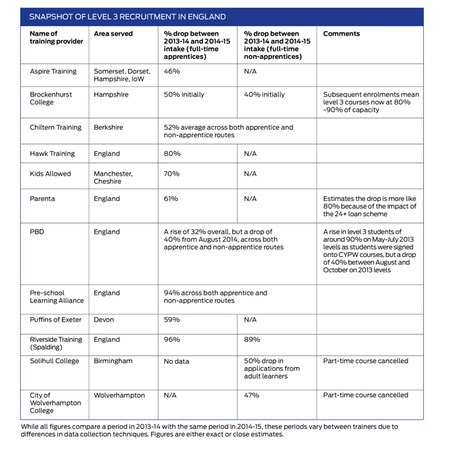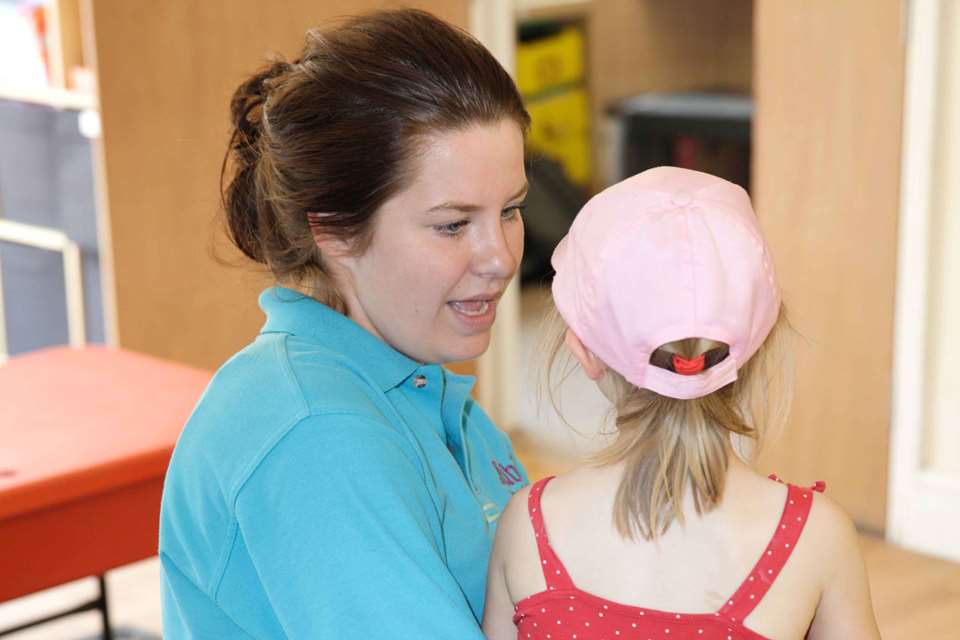Nursery Management: Qualifications - Recruitment quagmire
Monday, March 23, 2015
An awarding body, training providers, colleges and nursery owners are united in their opinion that new GCSE rules designed to improve standards aren't working. Hannah Crown investigates.

Changes to GCSE rules designed to raise standards in early years settings are doing the opposite, an investigation by Nursery World has found.
Training providers have reported drops of between 40 and 96 per cent in the number of students on Early Years Educator (EYE) courses across the country. Awarding body Cache, which has a 51 per cent share of the childcare qualifications market, estimates that the number of students doing its level 3 EYE diplomas (i.e. work and college-based courses) has dropped by half on last year.
Business development director Julie Hyde says, 'If we are comparing EYE against a legacy qualification it's about a 50 per cent drop. The impact will be a significant lack of level 3 provision. We all support the idea of raising standards, but there is a transition period that has not been taken into account. We are in danger of having a level 2 workforce with no level 3 managers - that is not what anybody wants.'
The number of people currently doing any level 3 course is 'about the same' because of a sector-wide rush to sign people up to the EYE's predecessor, the Children and Young People's Workforce (CYPW) qualification, which didn't have as stringent GCSE requirements, she adds. 'The concern is, will employers recognise the CYPW qualification, which is entirely full and relevant, as being so?'
Jennie Johnson, CEO of Kids Allowed, which runs a training academy, is one of several training providers to report an equivalent or greater drop in apprenticeship numbers (see table). 'There will be nobody coming through the system,' she says. 'The effect is to lower standards - the opposite of what was intended. We all want quality. But we're having to turn people away who would be fabulous practitioners.'
The effect of the changes is also preventing level 2s progressing, says Cheryl Hadland, MD of Hadland Care Group. She says, 'Students can't retake the GCSEs so they are not completing the courses. If a person struggled to get their GCSEs at school, they're not likely to be able to do them alongside an early years course, especially if working as well.
'We are going to be decimated. The Government has basically stopped nurseries employing level 3s.'
The new EYE standard, which came into force last September and applies to both apprenticeships and work and college-based EYE diplomas, requires that students need at least a GCSE grade C in maths and English.
Deputy Prime Minister Nick Clegg said last month that this was an 'uncontroversial expectation'. 'Quality does require we are a bit more exacting about the qualifications people bring to the sector,' he said.
Government data shows 60 per cent of 16-year-olds achieve maths and English GCSEs at grade C first time, while a recent study showed just seven per cent of people retaking these subjects achieved them by 18.
Trainers are now disincentivised from taking students without the GCSEs, claims Stella Ziolkowski of the National Day Nurseries Association. She says, 'Those who have their own contract with the Skills Funding Agency, and who grow their own apprentices, find it's too much of a risk to put them through their GCSEs as well as their childcare qualifications. A large proportion of their funding - £724 per person for GCSEs - is paid only when they pass.
'GCSEs demand smaller groups and more intensive learning. As a result, fewer people are being taken on for level 3 training while hundreds of candidates without GCSEs are being turned away.'
LEVEL 3 NUMBERS PLUMMET
A survey of 12 training providers found drops of between 40 and 96 per cent as a result of the 'GCSE effect'.

Two colleges, City of Wolverhampton and Solihull, have cancelled part-time adult courses as a result. City of Wolverhampton curriculum manager Nikki Palmer says, 'We have lost our part-time course for level 3 for mature students as the majority of them don't have the GCSEs. Full-time students, who are on a two-year programme, can do functional skills and move onto GCSEs next year. The alternative is a teaching assistant course that doesn't need the GSCEs - even though you are working in a primary school.'
There are some signs that recruitment is recovering. Brockenhurst College head of early years Lisa Bell says, 'A recent open evening confirmed that learners and parents are well aware of the changes to entry requirements for EYE. We have a "keeping warm"strategy which keeps all learners up to date. We are confident that recruitment will continue to grow.'
Other factors, such as the rush to sign up trainees onto CYPW courses before the rules changed, have inflated the number of pre-September 2014 entrants. Conversely, numbers of apprentices aged over 24 could have been depressed by the introduction of a loan scheme in 2013. Local factors such as schools opening sixth forms, as experienced in Solihull, will also distort the picture. However, the figures do show a radically altered qualifications market. One provider reported just two level 3 apprentices starting this year, down from 45.
Gillian Fawcett, director of Puffins of Exeter, echoes the concerns of many when she says 'the real test' will be the next academic year, as only five of her current intake of 20 level 2s have got the required GCSE grades.
A Department for Education spokesman says, 'Ensuring children have the best start in life is a vital part of our plan for education and the EYE qualification will raise the quality and status of the workforce. Implementing this reform will take time, but with 87 per cent of the existing workforce holding a level 3 qualification, we are confident there will be sufficient qualified staff.'
THE IMPACT ON EMPLOYERS
'Ratio and qualification requirements are hindered because of the increasing need to rely on level 2 practitioners,' says Sally Mayer, head of nurseries for The Co-operative Childcare.
Because of the drop in students doing EYE courses, the Co-op 'will need to be more innovative in attracting new candidates, and focused on retention. There will be a growing need to reward colleagues appropriately with improved salaries,' she says.
The group offers NVQ and apprenticeship training for all staff to attain a level 3, and is currently exploring with a further education company how candidates holding a level 2 qualification can be offered an apprenticeship at level 3 and carry out their GCSEs alongside.
Other initiatives involve relaunching a 'Men in Childcare' campaign, focusing on appealing to a mature audience, and spending £5,000 on a training nursery at City of Oxford College. 'Recruitment solutions during 2014 were successful. However, with demand in the sector for practitioners at an all-time high and with fewer qualified people available and fewer choosing childcare as a career, we have had no choice but to rethink. We have a good percentage of colleagues at level 3 and above, which gives us the flexibility to modify our recruitment approach for this year,' Ms Mayer says.









